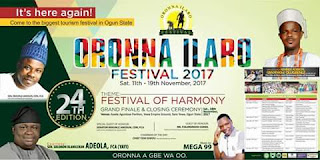Dr. Orlando Owoh : 9 years remembrance today!
Wherever Orlando Owoh went for boxing competitions, King Sunny Ade was the manager of his boxing kits.
You guess right, the same Juju musician, Sunday Adeniyi. Orlando was also good boxer that everybody wished to associate with.
Though, Orlando Owoh could not go beyond Standard 6 education but he travelled round the World, he
received honorary degrees and awards from many higher institutions of learning which included the University of London and got offers from foreign labels.
Three of Orlando' sons, Orimipe, his first Son, Daisi and Kunle Orlando Owoh who inherited Kenneries band are also Musicians, they are all based in America. Kunle is always on ground to play in Nigeria.
Orlando was the only musician in Juju History who could enter music studio to record without rehearsal. What he would only need was to take his Igbo. He was the only musician whom late Fela Anikulapo-Kuti allowed to sing in his African Shrine in Lagos.
Orlando waxed his records for Hausas (Allah LA tuba...), he remembered the Nigerian famous footballer, Samuel Okparaji who died in Lagos during Nigeria qualifying match ("NFA, Nigeria Football Association, I sympathize for the death of Okparaji, You come from Europe to represent your father's land, destination can be changed but destiny can never be changed")
Dr. Stephen Oladipo Olaore OWOmoyela popularly known as Orlando Owoh was born in Osogbo, Osun State on 14th of February, 1932.
His Father, Jeremiah hailed from Ifon in Ose, while his mother, Morenike was from Owo in Ondo State.
Orlando joined the carpentry and Construction business of his father after his Standard 6 Education. But his mind was not on the job, he had to relocate to Ilesha and Ibadan from Oshogbo. He was hired by Kola Ogunmola Theatre Group in 1958 to play drums and sing because of special music talents.
Two years later, Dr. Orlando Owoh formed his Omimah Band, later turned it into 'Young Kenneries' and 'the African Kenneries International'. Dr. Orlando Owoh was popular Juju musician, band leader in Nigeria.
He had over 45 albums to his credit which were mostly produced by Decca Records (Afrodisia records), Electromat records and Shanu-Olu records. Among them were ; Ajanaku Daraba, Apartheid, Asotito Aye, Awa de, Ayo mi sese bere, Cain ati Abel, Easter special, E ku iroju, Emi wa wa lowo re, Experience, Ganja I, Ganja II, Ibaje eniyan, Igba aye Noah, Ire loni, I say No, Iwa l'Oluwa nwo, Iyawo Olele, Jeka sise, Kangaroo, Kennery de ijo ya, Kose mani, Late Dele Giwa, Logba Logba, Ma wo mi roro, Message, Mo juba agba, Money 4 hand back 4 ground, Oriki Ojo, Orin titun, Thanksgiving, Which is which. E get as e be.
His wives included; Muyibat, Folashade and Funke.
Dr. Orlando Owoh died on the 4th of November, 2008 at Ikeja General Hospital, Lagos and was laid to rest at his Agege residence in Lagos against his wish. As his manager, Samuel Olayiwola a.k.a Musese (E ba mi ki Musese, Owoh Nile Oni Musese...in Orlando record) said Orlando wanted the family to bury him in his Ifon residence but his wives rejected the idea.
































